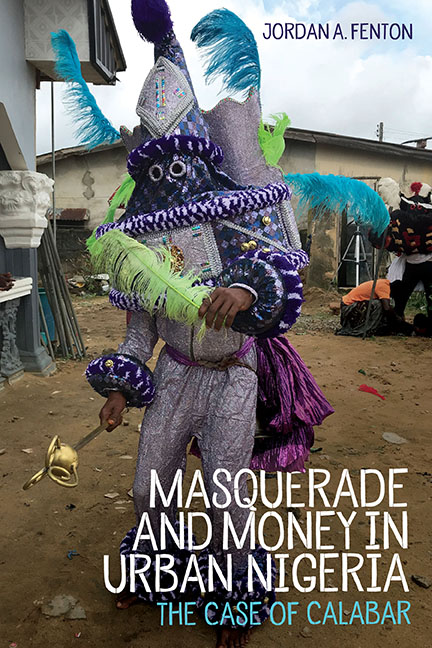Preface and Acknowledgments
Published online by Cambridge University Press: 26 May 2022
Summary
This book explores the contemporary relevance of the culture of masquerade active in Calabar, an emerging and growing city in southeast Nigeria. The spatial and economic aspects of masquerades are stressed, revealing these cultural expressions as dynamic, valued, confronted, but never waning in the face of change. In what follows, the voices of cultural custodians and members of these masquerades are heard throughout this book, endeavoring to tell a story from the perspectives that matter most.
Field research for this book started in 2008 when I first arrived in Calabar (capital of Cross River State, Nigeria) as a doctoral student. However, I could easily say my dedication to this region and topic stretches over fifteen years, stemming from my undergraduate and master's degree experiences, especially since my thesis explored the skin-covered mask of the Cross River region. Since my initial trip in 2008, I returned several times to the field to continue learning from my teachers and deepening my research in Calabar. Field research for this book draws on the experiences of six trips (a total of nineteen months) conducted between 2008 and 2018. Over these years, many institutions and people graciously helped fund, support, advise, and shape this book.
Fieldwork conducted in Calabar, Nigeria, was generously funded by the Jeanne and Hunt Davis Research Travel Grant, Center for African Studies, University of Florida (2009), and the US Department of Education in the form of two Foreign Language Area Studies fellowships (2008 and 2009) and a Fulbright-Hays DDRA fellowship (2009–2010). Thanks to the Smithsonian Institution for funding research and writing while I was in residence at the National Museum of African Art as a Smithsonian Predoctoral Fellow in 2011. My previous institution, Kendall College of Art and Design of Ferris State University, funded summer travel to Calabar in 2014. My present institution, Miami University (Ohio), through the Office for the Advancement of Research and Scholarship in the form of a Summer Research Award, funded a trip back to Calabar in 2016. And finally, a summer trip to Calabar in 2018 was made possible with support from the College of Creative Arts at Miami.
- Type
- Chapter
- Information
- Masquerade and Money in Urban NigeriaThe Case of Calabar, pp. ix - xiiPublisher: Boydell & BrewerPrint publication year: 2022

